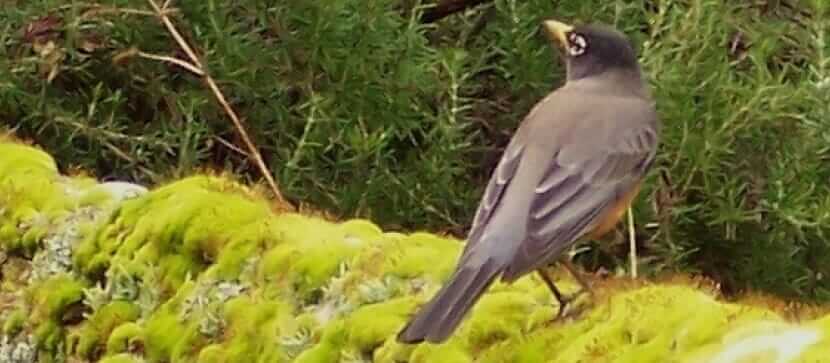During the past two weeks Robin returned to Chinook and the ground woke up. Not spring, not yet—although buds are swelling and the leaves from subterranean bulbs are bursting through the soil. Robin wakes up a whole dimension of perception.
Flocks of siskins swirl in the sky all winter and startle suddenly out of trees in palpable whooshes. On one afternoon Thomas and I watched a hunting sharp-shinned hawk strike into a favorite fir of one flock, spraying siskins out of the other side like buckshot.
In the fall the juncos gathered on the ground in large flocks. Since then it seems that they spend more time removed in shrub and tree. A month ago flocks of male ruby-crowned kinglets foraged fervently on the ground, undistracted as they moved closely around the place where I stood. Why only males? Why so suddenly bold? The behavior went on for a few warm days and remains a mystery to me.
On certain sunny crisp days and after bouts of extreme weather, when the quiet sets in, the forest is tinkling with mixed flocks of kinglets and chickadees like raindrops pattering on the leaves. Among the evergreen huckleberry on the trails it is not uncommon for kinglets to hover as they flycatch just near your face.
Song sparrows travel quietly along beneath the flocks, deeper in the shrubs. Towhees deep in the forest (and often closer on the edges than they seem) can be heard from great distances mewing and creaking at movements of other creatures that go unseen by human eyes. And varied thrushes are always watching from the ground or a low branch, always right at the moment when you begin to feel alone in the forest.
Often when I sit quietly in the winter forest of Chinook for about ten minutes, I am startled when the bark of firs begins to crawl along the trunk. As my eyes focus in, I see small groups of brown creepers (often in twos and threes per trunk) animate the browner, barkier places. At those times, I am astonished to see also the true spectacle of pairs of nuthatches turning tight flying spirals downward around the trunks of trees close enough for their feathers to brush the surface. How is this possible—so fast, so graceful, so playful of movement?
And our pair of resident ravens who are simultaneously ubiquitous and phantom-like in their vigilant presence at Chinook . . . but they are for another post.
Of all these avian marvels of winter at Chinook, there is none quite so everyday and quite so perception-shifting as the return of Robin. Robin overwinters at various places on Whidbey Island, but there had not been any, to my knowledge, on the Chinook land.
Although I had seen a few in the trees, the return of Robin’s presence did not fully sink in until one day a robin and a varied thrush began foraging near me while I worked at the vermiculture bins. I have never had a varied thrush come comfortably on the ground near me until this robin arrived. And maybe that varied thrush felt something of what I feel in the presence of the robin, like I am more aware of what is going on around me and I am safer because someone is watching my back.
Robin, unlike Towhee or Song Sparrow and more than Junco, is out amongst us two-leggeds, on the lawn, in the garden. Between each dashing strut of rust on green-grey ground, Robin is still and alert with head cocked, speaking to me. At the twitch of the tail and the quiet tut tut I see Robin’s nervousness. At the swoop into the tree, the twitching tail, and the concerned peek! tut tut sound I know Robin is pushed beyond comfort, often with head facing the object of concern. At the high pitched seeeeee! with the robin bolting into a shrub or pressed flat to the ground, my head looks skyward for a bird of prey. Robin speaks in detail of dogs, hawks, weasels, humans, weather, and any threat or presence. But most profoundly, Robin tells me about myself, all day, everyday.
As I move across the landscape at Chinook, I practice what some have called “the honoring routine.” When I am calm, aware, giving space, and moving peacefully, Robin will not respond in any of those ways I listed. Instead, Robin will watch and continue about his life and sometimes, like near the vermiculture bins, we will fall into a tango-like rhythm, each of us sensitive and responsive to the quality of the other.
As spring advances and the robins settle into their respective territories for the breeding period, each place in the landscape will be occupied by unique robin personalities giving continuous feedback on our way of being in the world. During this part of the year, now quickly upon us, it is as if not only my awareness, but also my conscience has bled out of my person and into the land. Perhaps in the dark introspection of the depths of winter we do not need Robin as much. But as the light seeps back into the days bringing with it the busy mind, I welcome Robin back to Chinook.
—Robert Mellinger

